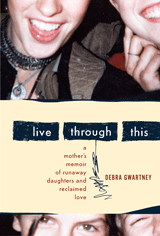Each day leading up to the March 11 announcement of the 2009 NBCC award winners, Critical Mass highlights one of the thirty finalists. Today, NBCC board member Karen Long discusses autobiography finalist Debra Gwartney's Live Through This: A Mother's Memoir of Runaway Daughters and Reclaimed Love (Houghton Mifflin Harcourt)
Some books are meant to be savored; some must be inhaled.
Live Through This put a hitch in my respiration, and not merely because of my own autobiography as the mother of a complex teenaged girl. This rare memoir clamps onto the core fear of any parent—the terror of Hansel & Gretel, of children lost in the woods.
About a year before her daughters jumped a train and disappeared, Debra Gwartney gave them Nirvana’s “Nevermind” and Hole’s “Live Through This,” a channeling of Courtney Love’s anguish after Kurt Cobain’s suicide.
“I remember the puffed-up pleasure of being a with-it mother who carted the albums home and let her daughters hang a giant poster of a mascara-stained beauty queen on the wall of their bedroom,” Gwartney writes of their Portland, Oregon, home. “A few months later, I was blaming that same music for making my kids angrier than they already were.”
Middle-class propriety was no shield. This was a mother who prided herself on grating fresh nutmeg on the Christmas eggnog, on limiting television viewing to an hour per night. Nor was having bright, literate daughters a safeguard. Amanda read Adrienne Rich’s poetry and Denis Johnson’s stories; Stephanie, her kid sister, earned only As.
Yet, in the freefall of adolescence, Amanda was slapped with a first-degree felony charge just months after a last tea party with her younger sisters—she had set a trash fire in her middle school’s bathroom. Stephanie, four years after playing the wise-cracking Pepper in “Annie,” was knifed by a stranger in San Francisco’s Tenderloin district.
Gwartney learns of this assault years after the fact but describes it in her prologue, which begins with the author’s chance encounter with a smelly runaway sitting next to her on a Portland city bus. It was a decade after her own daughters fled—Amanda for three months, Stephanie for a year.
Even though all her grown children were now safe, Gwartney looks at the reeking girl on the bus and registers rage: “Why do I feel more like slapping her than hugging her? What’s wrong with me, still, after all this time?”
Lighted from the inside with a fearsome truth-telling, Live Through This lets the reader walk around a wreckage that was partly of the author's own making. Twenty-one and pregnant, Gwartney impulsively had married a fetching, hard-drinking bad boy. Twelve years and four daughters later, she was hell-bent on getting out.
And maybe this story began even earlier. Gwartney’s own parents were rebels, married at 16 and 17. The author’s father, fearing a version of his own wildness, put bars on the basement window behind which a young Debra and her sister slept.
On page 57, Gwartney poses the question that comes one day for the best of parents: “How do you get any kind of control back once it’s utterly, totally gone?”
One could fill a wing of American literature with coming-of-age stories that celebrate the severing of that control. Live Through This reads as an important corrective, almost like an adult call-and-response.
“Amanda and Stephanie out there somewhere,” Gwartney writes, “asking for money as strangers passed by, eating food pilfered from garbage cans or gathered up at shelters. The drugs whistling through their bodies. . . . Where did they go to pee? Where did they find toilet paper or soap or clean underwear or socks without holes?”
The hipness of the open road will beckon, but this remarkable story has given voice to—and a generous example of—the flip side, the family that must bear up after the spin of the venturesome, reckless coin.
Click here to see Debra Gwartney discuss Live Through This


